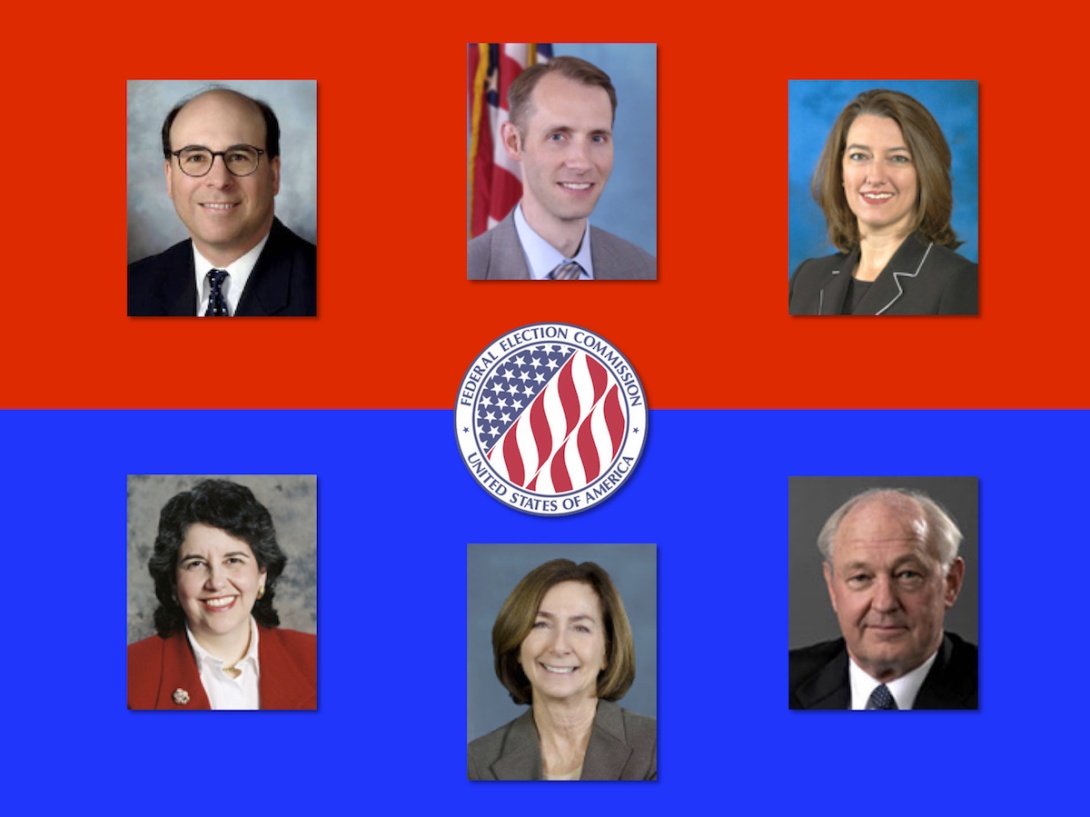Ruling against the Federal Election Commission is a win for political money transparency

A federal judge found that the FEC disregarded campaign finance law when it dismissed a watchdog complaint against two Koch-connected nonprofits that spent millions on elections but did not register as political committees. The ruling could lead to increased campaign finance transparency. (Clockwise from top left: Republican FEC commissioners Lee Goodman, Matthew Petersen and Caroline Hunter; Democratic commissioners Steven Walther, Ann Ravel and Ellen Weintraub.)
A good-government group has won its case against the Federal Election Commission for negligence in enforcing campaign finance laws against two conservative political groups that have ties to billionaire industrialists and conservative juggernauts Charles and David Koch and that were active in several Southern states.
Citizens for Responsibility and Ethics in Washington (CREW) filed a complaint with the FEC in 2012 against Americans for Job Security and the American Action Network for failing to register as political committees while financing $27.6 million worth of political ads during the 2010 elections. AJS is an anti-union 501(c)6 nonprofit trade association based in Virginia, while AAN is a 501(c)4 "social welfare" nonprofit based in Washington, D.C.
After the FEC dismissed the suit, CREW sued the regulatory body itself.
This week a federal judge ruled that the FEC was "arbitrary and capricious" when it dismissed CREW's complaint against the groups and will need to reconsider it. The ruling could dramatically change how the FEC investigates nonprofits that spend on politics and consequently increase election-spending transparency.
"The case sees through the problematic tactic of using bogus 'issue ads' that are clearly political in an attempt to evade transparency and accountability," CREW Communications Director Jordan Libowitz told Facing South.
To avoid violating their nonprofit status, the primary purpose of trade organizations and social welfare groups must not be political activity. Unlike the 527 political committees known as super PACs that have strict political disclosure requirements, trade organizations and social welfare groups are not required to disclose their donors except when reporting political expenditures that explicitly support or oppose a candidate for office and, in some cases, expenditures on so-called "electioneering" ads that run close to an election and criticize or support candidates without asking citizens to vote for or against them.
In 2010, AJS spent $9.5 million on political ads benefiting Republican candidates including considerable amounts on U.S. House and Senate races in the South: nearly $1.7 million in North Carolina, close to $900,000 in Arkansas, over $500,000 in Virginia, and smaller sums in Florida, Georgia and Kentucky.
Of that amount, $4.6 million went toward electioneering communications. Though political ads amounted to nearly 77 percent of AJS's 2010 spending, it did not register as a political committee with the FEC.
AJS's income that year included $4.8 million from the Center to Protect Patient Rights, an Arizona-based social welfare nonprofit that served as a key funding source for the Koch political operation, and $3 million from the Wellspring Committee, which has funded Koch-backed political groups including Americans for Prosperity.
That same year, AAN spent at least $18.1 million on ads targeting 29 races, with $13.7 million of that going towards electioneering communications. Though the ad buys constituted nearly 67 percent of the group's spending from 2009 to 2010, it did not register as a political committee or reveal who funded the ads.
AAN spent millions on Southern races for U.S. House and Senate, including nearly $2.3 million in Virginia, over $500,000 in West Virginia, and close to $190,000 in Arkansas, according to the Center for Responsive Politics. AAN received over $300,000 from the Wellspring Committee in 2010 and donated $200,000 to the Center to Protect Patient Rights in 2011, according to Conservative Transparency.
In 2011 and 2012, CREW filed complaints against AJS and AAN for failing to report numerous electioneering communications to the FEC and not registering as political committees.
The FEC's own Office of General Counsel found that both groups had broken campaign finance law. But in the summer of 2014, the FEC — by law a six-member body evenly divided between Republicans and Democrats — gridlocked as it often does, with the three Republicans asserting in both cases that electioneering communications should not be considered when judging how much of an organization's work is political.
The case against the FEC
The FEC's dismissal of CREW's complaints didn't stop the watchdog from continuing its fight. In August 2014, CREW sued the FEC for failing to enforce campaign finance law against AAN and AJS.
"Due to the FEC's inaction, AAN and AJS have become a template for political groups to hide political spending," CREW's complaint stated.
AAN and AJS still have not registered as political groups. AAN has continued to spend on elections, funneling millions of dollars into politics in 2012 and 2014; so far this election cycle the group has documented over $600,000 of ad spending on U.S. House races. AJS spent nearly $16 million in 2012 but hasn't reported any federal ad buys since then.
Last December, CREW filed a motion for summary judgment against the FEC. On Sept. 19, U.S. District Court Judge Christopher Cooper ruled that "the controlling commissioners relied on a faulty legal premise in applying the 'major purpose' test … The commissioners' decisions were thus 'contrary to law.'"
The judge ordered the FEC to reconsider the complaints within 30 days. The FEC has the option to appeal the ruling.
"We are very hopeful that all of the FEC commissioners will take the court's decision to heart, find the ads in question to clearly be political ads, and accordingly determine that AAN and AJS had a major purpose to affect elections and must disclose their donors," said CREW's Libowitz. "If somehow three commissioners again prevent meaningful enforcement, CREW will consider whether additional legal action is appropriate."
Judge Cooper's ruling is a watershed moment for campaign finance law as the definition of "political activity" will now include electioneering communications. This new definition is expected to either force numerous organizations to significantly decrease their political activity or to register as political groups, thus increasing transparency of their ads and donors.
Libowitz said the decision "sends a strong signal" that the FEC needs to enforce the law and has energized his group to ramp up its watchdog efforts.
"Now that we have seen clearly that courts will compel the FEC to do its job even over the opposition of obstructionist commissioners, we will redouble our efforts to find serious violations and ensure that they are adequately addressed," he said.
Tags
Alex Kotch
Alex is an investigative journalist based in Brooklyn, New York, and a reporter for the money-in-politics website Sludge. He was on staff at the Institute for Southern Studies from 2014 to 2016. Additional stories of Alex's have appeared in the International Business Times, The Nation and Vice.com.
